Near + Far Read online
Page 4
As he might have expected, the four of them had stayed in touch with each other. Fred had been off in Tibet, she said, and added, "Studying some sort of transcendental stuff." Penelope had recently approached Casey about a film project.
"A chance to break into films." Casey's dimples were still deep enough to lose your heart in. "It's very kind of her, to give me that."
Something odd about her tone. Perhaps she and Penelope had had a falling out? Glen thought better of questioning it, not wanting to bring up a potentially upsetting topic.
"I bet the others would like to see you," she said. "Fred's got a box at the baseball stadium, and we're all going there next Saturday."
His wife would be out of town. There was no reason to say no.
At the game, deferential ushers showed them down a hallway to the luxury box. Again, a fridge full of beers, but this time wine and champagne as well, and harder stuff, all dispensed by a bartender with teeth as white as his apron.
No one seemed surprised by Glen's appearance after all this time. In fact, Fred said, "I was just wondering when we'd see you again."
Glen accepted a Heineken from the bartender and settled down to nurse it. The seats were covered with soft red velvet, clean and fresh. The rug underfoot was sculpted with deep swirls. Penelope and Derek were in a corner, arguing in low whispers. Penelope looked unhappy. Dark rings splayed themselves underneath her eyes.
The rest of them played "Whatever Happened To." Time had not dealt well with most of their classmates: several suicides, a public and inadvertent outing that destroyed a political career, multiple scandals (one involving a teacher).
"What about Alf?" Glen said.
A silence fell on the room like a curtain. Even Penelope and Derek glanced over from their argument.
"He jumped off a building," Fred said. "Isn't that right, Casey?"
Glen was uncertain whether or not to laugh. Fred's tone implied he should; Casey's angry face said he shouldn't.
"We don't talk about Alf," she said briefly.
After the game, they went back to Fred's loft, this time a place of exposed brick and floor-to-ceiling windows and stainless steel appliances and an enormous balcony somehow joined onto the side of the building. Casey followed him out onto it. She laid her hand over his. Her perfume hadn't changed after all these years.
He closed his eyes, inhaling. The sounds of the street floated up, cars and shouts, and distant rap music. He could feel her next to him. When he opened his eyes again, the light dazzled him.
"I've always liked you, you know that, don't you?" she said.
He flashed on moonlight and a grainy screen. "I have a wife," he blurted out.
"It's like high school again," she said. "Never the right time. Maybe someday we'll meet when the moment's ripe."
He wanted her, she wanted him, but thoughts of Eloise fettered him. "Give me something to remember," he said. "Something to fantasize about till then."
Years of longing pressed his mouth to hers.
When he woke the next morning, his lips felt bruised and raw. He stared into the mirror, wondering what to tell—if to tell—Eloise. He didn't want to leave her, he realized. He was done with fantasies, illusions. They had built a good life together, one that outweighed any castle in the air.
Something about Casey made him wary. He'd sensed it before, first in girls and then in women—ones who thought themselves in total control of the relationship. Sometimes arrogance, sometimes just a deep belief in the power of pussy. Casey thought she had him sewed up, and that set him on edge.
Making coffee, he glanced out the window. Rain. But he'd left his hat at Fred's loft. When he called, Fred said sure, come over and get it.
He took a cab, thinking about Casey, going over and over the memory of the kiss on the balcony, the way she had looked at him when he'd stammered goodnight. She burned in his mind. He felt himself fluttering too close. Eloise, think of Eloise, of the comfortable house and the deck they liked to sit out on and read to each other. Eloise understood him, and liked him more than he liked himself, truth be told. Was the same true of Casey? Was she amusing herself with another three-day wonder like Alf, or was she in it for the long haul?
He complimented Fred on the loft again. Fred was blue-striped bath-robed, barefoot, and sleepy-haired.
"The place is all right," Fred said with a twist of his lips. "The view is nice, anyway. Have you seen Casey's place?"
Embarrassment struck Glen. What was Fred implying?
"No," he said.
"Not yet, eh?" Fred said.
"What do you mean?"
Fred looked at him, surprised. "She wants you. You can tell that, certainly."
"Yes," he said. The wonder of it fluttered in his chest. He added, "But I'm married, I told her that."
"Ah, a touch of frustration to up the tension. Well played."
Glen had the sensation of treading water far out of his depth. "I don't ... "
Fred said, "Do you love your wife?"
"Beyond any question," Glen replied without hesitating.
"How sad." Fred shoved the hat towards Glen and gestured at the door.
Glen resisted. "What do you mean by that?"
"Things have a way of working out for Casey," Fred said.
Two weeks later, Eloise was hit by a car that jumped the curb when its gas pedal got stuck.
She had been on her way to the hardware store to get a washer to fix a leaky faucet. Glen's first thought upon hearing the news was ridiculous irritation, a petty infant whimper regarding who would take care of small house repairs now.
Then the news hit him.
The bottom dropped out of his world. Shattered. He could feel himself flying in all directions, out of control. Helpless to control the explosion that tore him apart.
Casey wasn't at the funeral, but Fred was.
"A real shame," he said.
Glen fumbled for the unthinkable. "Fred ... you said ... did Casey have something to do with this?"
Fred studied his face. That same old avidity, a greedy hummingbird sipping at Glen's emotions. "How could she have?"
"I don't know ... all of you four ... everything seems so golden for you," he said helplessly.
Fred grinned. "Oh, does it seem odd? Are you waking up, zombie boy? Or is this all just part of her overall game? I thought she had this one refined by now, but she's never been finished working on you. What's the appeal, I wonder? All that shaggy poetic charm, with your hipster beard and earnest look and outlet jeans?"
Other people in the funeral crowd were watching. Glen leaned into Fred and said, low and fierce as he could manage, "I don't know what you mean, but I will, I promise you that."
Fred laughed.
"What about the music?" Glen said.
He'd scored a hit, he could tell. Fred took in a breath, released it. Said, "I don't know what you mean." He wheeled and walked away.
The house was empty without Eloise. He lived on Ritz crackers and KFC. He left the radio, the television on, tried to keep sound going in the empty rooms, but inevitably it all died away into grayness.
He turned the music up on his headphones, introspective Bach cello suites, complicated as crossword puzzles. He scoured the Internet, hometown paper microfiches, talked to old neighbors, every source he could find. Looking for anything about the four. Anything and everything.
Their existence had been charmed, he discovered. Parents had died early, leaving two in the care of permissive guardians. Fred's parents had been wealthy and aloof, Penelope's wealthy and extremely attached. He remembered they'd given her a baby-blue Mustang convertible for her sixteenth birthday, remembered seeing them all jammed into the car, Penelope at the wheel, Derek beside her, Casey next to Fred in the back seat.
All of them were only children.
Their teachers agreed that they got the grades they wanted to, but that sometimes they seemed to be doing the minimum. All spoke of their "independent" manner, and there were some disciplinar
y incidents.
Derek had given him a business card. When Glen called, he agreed to meet in a coffee shop. It was a rainy day, flickering between misty and a harder torrent as though unable to decide. A strong wind pushed the rain under passing umbrellas; they tilted to combat it. One blew inside out and fluttered past, its owner struggling to reverse it.
"Whatever happened to the Peaches of Immortality?" Glen said.
Derek froze for a second before saying, "What?"
Glen pressed. "Your band from high school. I always remembered hearing you play. You guys could have gone professional."
But for some reason, Derek relaxed. "That's a shitty life, really," he said. "Being famous is overrated." He said it with authority, and Glen wondered what Derek had done in the intervening years.
So it wasn't the music. But something about what he had said.
Standing out on the curb, he checked his theory. "The peaches of immortality," he said, testing it.
Derek stared at the street, expressionless.
"What does it mean, Derek? What are the peaches of immortality?"
Derek sighed. "Oh, it's this one," he said, abstractly. "Why bother? But okay. The peaches of immortality? Think of them as something a thinker stumbled upon, and gave to a couple of friends. Not immortality, not really. But something like it. A chance to live forever, certainly, but not really forever, to loop back through one's life over and over again."
"That sounds horrible," Glen said.
Derek fixed him with a hawk-like eye. "Do you really think so?" he said. "Really? A chance to go back and fix mistakes, to nudge destiny so it gives you all it can?"
The cab pulled up, splashing Glen but not Derek, who was sheltered by a trash can.
"I need to talk to you about this some more," Glen said. "Where can I reach you?"
Derek shook his head. "I'll call you in a couple of weeks. I don't have much time left with Penelope, I want to spend as much of it as possible with her."
"Is she ill?" She had looked fine, if subdued, at the baseball game.
"She commits suicide this month," Derek said. "Usually after the 15th, never before the 12th." He swung the cab door and hopped in, rolled away. The puddle surged at Glen, infiltrating his shoes with a wash of cold water.
Glen was at his favorite restaurant, an Italian place named Tropea. It had been a favorite for him and Eloise, and he hadn't dared come back until then.
He saw a profile, a fall of golden hair across the restaurant. Despite everything, his heart surged.
He forced himself to look away. This was all part of the ... plan? Scheme? Machinations? He absorbed himself in picking his bread roll apart into shreds.
A presence beside him. Familiar perfume: lemon, musk. He looked up and was lost. Her dress was pleated silk, a blue that echoed her eyes. Had they been that blue in high school?
She said, "Glen, I don't know what to say, I was so sorry to hear about Eloise."
He lowered his gaze again as though fighting off tears. "Thank you, Casey. If you don't mind ... "
He let that trail off. After a beat too long, she said, "Oh, you want to be alone. My apologies, Glen. I'll catch you another time."
And she would, he knew. Somehow she'd show up, checking to see if the hooks she had planted in him years ago were still firmly set. When she was ready, she'd collect him.
Derek called, mumbling into the phone.
"I can't hear you," Glen said. "What is all that noise?"
"I'm near construction," he said. "Look, this line isn't safe, not really. Not like anything is safe, but come down and meet me here?"
Here was a diner, red paper placemats and the smell of coffee and burned toast. Glen slid into the booth across from Derek, who looked as though he hadn't slept or shaved in several days. His eyes were red-rimmed, and the flesh of his face hung loosely.
"I'm sorry about Penelope," Glen said.
Derek shrugged, curling his fingers around his coffee cup as though cradling it against harm. "It happens."
"How does it happen?" Glen said. "How do you keep going back in time?"
Derek stared into the curling steam of his coffee. "Once upon a time, there was a smart little Asian kid," he said. "A hyperachiever, whose grandfather spent his life trying to achieve immortality. To find the peaches of immortality. And so his grandson decided to do the same, through a combination of a bunch of things you don't have jack shit chance of understanding, involving the basic way the universe works and he learned that you could project your consciousness back through time and relive your life. Not only that, but you could shape events through concentration and purposeful thought. And he grabbed a couple of friends, friends who had also been unloved nerds in high school and then gone on to become nerdy losers, and said, how about we give this thing a shot?"
"How do you control it?" Glen said.
Derek sighed, a long exhalation as though his soul were trying to escape. "Fred's got it," he said. "He stole it from me a long time ago. Now I'm just a hamster like you. A hamster with a nicer wheel, maybe, but a hamster nonetheless. Do you really think we haven't had this conversation before?"
"How many times?" Glen asked.
"Forty, maybe fifty? Whenever Casey picks up with you again."
The number staggered Glen. Then he thought of something even more staggering.
"How many times have you done this?" he asked.
Derek shrugged. "Hundreds. I'm pretty sure we haven't topped a thousand yet. Who knows? It's a game now. Fred and Casey figure out what we score points on this time, and here we go again."
When Glen arrived home, Casey was sitting jack-knifed on his doorstep. She didn't look the way he usually pictured her, put together as carefully as a fashion model, every glossy hair in careful position. Instead she wore an old sweatshirt and no makeup. She'd been crying. Rain glittered on her hair.
"What did they tell you?" she demanded. "Those fuckers, don't you know—all they want is to keep us apart!"
He regarded her warily, even though his heart ached at the sound of tears in her voice. Had she killed Eloise? Was any of this true, or was he going mad in some complicated, paranoid way, driven insane by the stress of his wife's death?
"Let's go inside and dry you off," he said.
But even muffled by a towel, the question emerged again. "What did they tell you?"
"That you all keep living the same life over and over again," he said.
She tossed the towel on the sofa and combed her fingers through her hair. "Not the same life," she said. "We change it each time."
"How?"
"When you're a baby, at first, you're half there and half not. You can shape things." She shrugged.
"Shape them?"
"Steer them one way or another. Money's easy after college—you can play the stock market, but high school's harder to change. But enough work and you can change your family, the circumstances you're born under—not outright change, but you can push them one way or another."
"Like eliminating a potential sibling," he said.
"That was just a coincidence," she said. "Do you really think we'd kill people? Even knowing that they're still alive in another time-line? How ruthless do you think we are?"
"Ruthless enough when it comes to getting what you want," he said. "How hard was it to 'shape' Eloise's death?"
"I would never ... " she said, but broke off at his look. "Oh, god, this one's falling all apart. Why are you so difficult? I thought if I just set things up in high school but didn't follow through, you'd be so ready now."
He stared at her. "Do I count for extra points in this game you're all playing? Do you allot so much per personal victory? What about the rules, how do you set them all up ahead of time?"
"Before we die, we manage it," she said. "We have to all stay in touch to make sure, and Penny's been opting out for a while, but that just means we tell her what her goals are." She smiled. It was a mean smile.
"Who decides the goals?"
"W
hoever won last time, of course," she said with a touch of sullenness at his obtuseness.
"Get out," he said. He couldn't stand being in the same room with her anymore. She made his skin crawl. How many times had she seduced his other selves?
But she came toward him, pleading. "We can still recover this game, you know. And this time, this time you caught on ... " She broke off.
"Caught on? What do you mean?"
She lowered her eyes. "We call them zombies, all the people we shape. They're so slow to catch on. Most of them never do. But now you're awake and not a zombie anymore. You can become one of us. You and I can be together over and over again."
Over and over again, repeating their lives.
"I'd sooner die," he said.
"All right," she said. "I'll go now."
But over her shoulder she said, "You'd sooner die this time. But I can keep on trying."
When he got to Fred's, he half expected Casey to be there before him, but she was not in evidence when Fred opened the door. Glen pushed past him.
"Very abrupt and angry," Fred drawled. "Oh my, did she actually overplay and wake you up? We used to be so careful about that sort of thing."
"That's why you don't play the music anymore," he said. "But why play it in high school?"
Fred flopped onto the couch. "Dude, do you remember high school?" he said. "It's boring as shit. Why not be rock stars for a bit? Get people stoned, they don't remember what they heard. Particularly when they won't hear it again for a while. It's an indulgence."
"What did Casey mean about Ana visiting, all those years ago?"
Fred laughed. "That's how we used to warn each other if we got too anachronistic. It was hard keeping all of that straight at first. We got better at it."
"So you go back and engage in some juvenile dream of being a high school rock star?" Glen snorted.
For the first time, Fred lost his condescending calm. "We've been actual rock stars," he said. "Did that a couple of times. It's overrated. Too many people following you around all the time." He smiled, "But just think, in another world, Peaches of Immortality hit the Billboard charts seventeen weeks in a row."

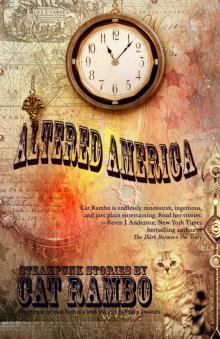 Altered America
Altered America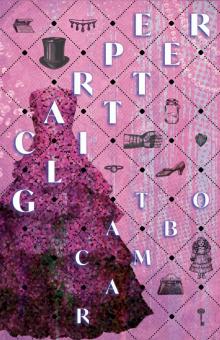 Carpe Glitter
Carpe Glitter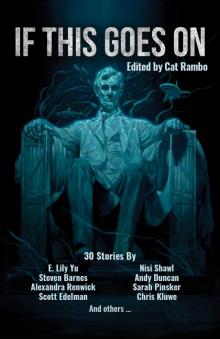 If This Goes On
If This Goes On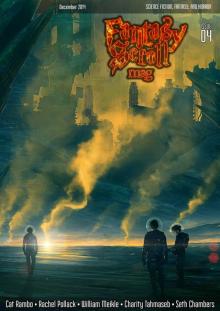 Fantasy Scroll Magazine Issue #4
Fantasy Scroll Magazine Issue #4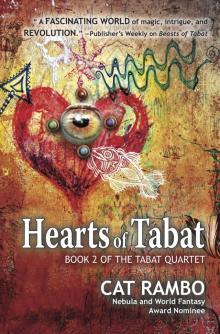 Hearts of Tabat
Hearts of Tabat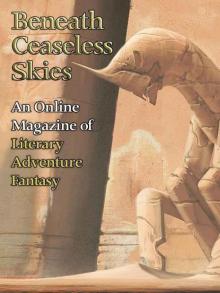 Beneath Ceaseless Skies #151
Beneath Ceaseless Skies #151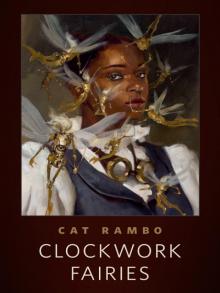 Clockwork Fairies
Clockwork Fairies Beneath Ceaseless Skies #170
Beneath Ceaseless Skies #170 Sugar
Sugar Near + Far
Near + Far Eyes Like Sky And Coal And Moonlight
Eyes Like Sky And Coal And Moonlight